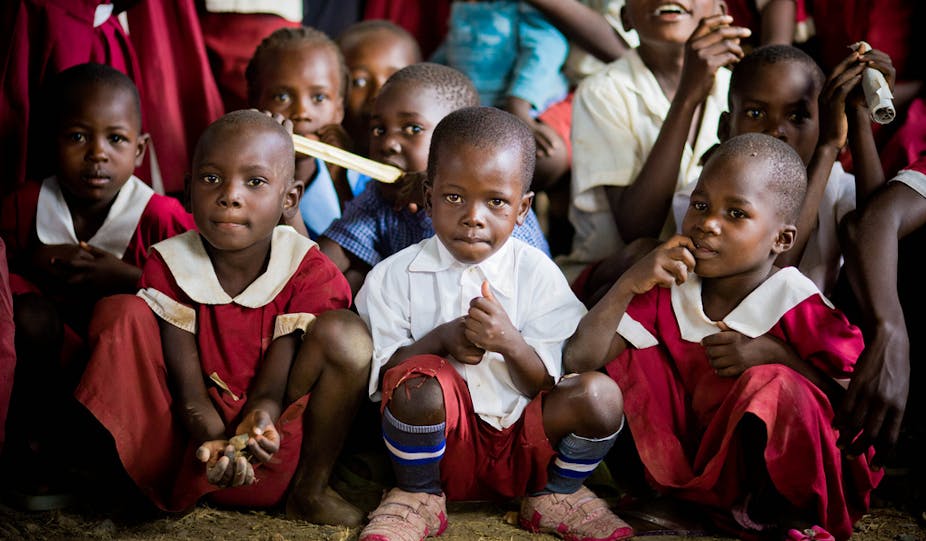During the run up to Kenya’s 2002 general elections, presidential candidate Mwai Kibaki promised to make primary education free for all Kenyans.
True to his word, when his coalition won the election and he formed a government, Kibaki directed that no child should be charged fees in any of the country’s 20,000 public primary schools. The government told the whole world it was offering free primary education. Donor agencies such as the UK’s Department for International Development and the World Bank flocked to support Kenya’s education sector.
Now, more than ten years later, a group of parents is suing a government minister angry that many schools are still charging fees. As education experts the world over pore of the results of UNESCO’s Education for All Global Monitoring Report, it’s clear there is still a long way to go to reach the goal of global universal primary education by 2015.
Under the free primary education law, families that had lost hope of ever sending their children to school got excited, turning up in large numbers to enrol them. But classes were congested. Teachers were overwhelmed. Some classes had about 100 pupils. Old geeks such as octagenarian Kimani Ng'ang'a Maruge joined Class One. He now holds the Guinness World Record for the oldest person to start primary school.
But more teachers were not recruited. More desks were not provided. The great promise slowly turned into a frustrating experience for both parents and teachers.
Parents were still expected to buy uniforms and pay for numerous fees charged to keep schools running as the government could not cover costs such as security, maintenance of structures or general staff. After the dust had settled, parents who could not afford the fees had to keep their children at home for lack of basic school requirements.
To survive, teachers reduced the amount of assignments they used to give pupils. The personalised attention children had been used to became history.
The free primary education promise has failed because it was a political pledge that was never translated into a policy framework complete with requisite resources and personnel.
The priority should have been to construct enough classrooms and boarding facilities in existing schools, hire more teachers and plan for meals in schools, all of which could have attracted and retained children in school.
Kenya’s education system is sick and requires urgent expert attention and political goodwill. It requires a political class that can provide the required resources. It requires experts that can point out the rot and mop it up without thinking about political repercussions.
Teachers are poorly motivated. They have to threaten to strike to be promoted. Teachers’ unions have to do a lot of convincing – including coercion – for the Kenya’s Teachers Service Commission, which employs the country’s teachers, to improve their lot.
Retired teachers have struggled to get the pensions and terminal benefits due to them. The number of former teachers is rising, thanks to natural attrition, deaths, resignations and desertions.
Free primary education has turned out to be a big lie. We should call it subsidised primary education. But the subsidy is so small that headteachers have been pleading for increasing funding to take care of escalating inflation.
As a result, schools have been introducing all sorts of charges which parents are forced to pay to keep their children in school. Threats by government mandarins to punish headteachers who charge illegal fees have come to nothing.
In Kenya, the teaching profession has become a very dangerous career choice. If exam results show that a school has not done as well as expected, teachers can become targets for angry communities. In some cases, teachers have been assaulted. In others, parents demand the transfer of headteachers for their laziness and complacency.
Ten years on, Kibaki’s promise of free primary education is faced with serious trouble. Not to be left behind, Kenya’s new president Uhuru Kenyatta has come forth with yet another grandiose laptop project that may define his legacy either way. The government is planning to give free laptops to all children in the first class of primary school. But the programme has been delayed over costs.
Most of the children to whom the government plans to give laptops walk to school barefooted, wear torn uniforms and go hungry. Others still learn under trees. Most teachers are computer illiterate. How on earth will they be expected to help pupils use the laptops as learning aids?
The primary schools have very poor security safeguards for both teachers and children. How safe will the laptops be? Can a six-year-old child safely carry a laptop to school and back home without messing it up or attracting petty thieves along the way?
The fortunes of education in Kenya will only be turned around when the political class starts involving experts when they make their election campaign pledges. They should only make and implement pledges that the economy can sustain beyond their political lifespan.

